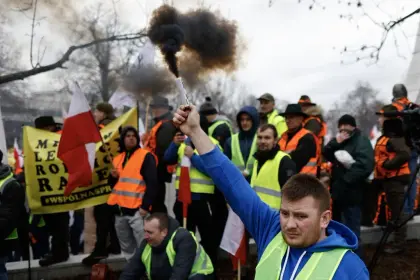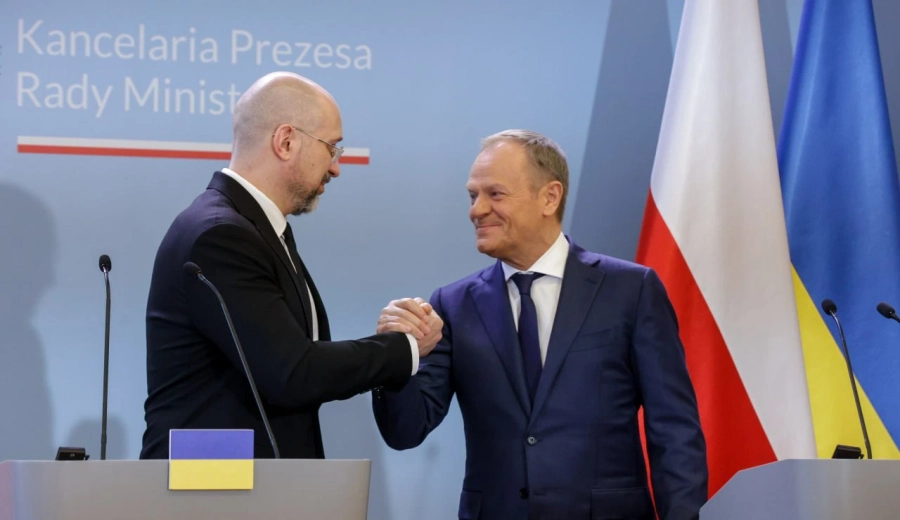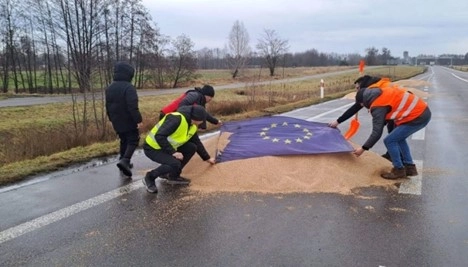Polish Prime Minister Donald Tusk hailed his Thursday meeting with Ukrainian counterpart Denys Shmyhal as a “step forward” as the allied countries attempt to bridge differences over farm imports and border blockades by Polish farmers that have frayed ties between the two countries.
That said, Tusk will likely have a challenging task ahead of him if he wishes to satisfy the demands of the protesting Polish farmers.
JOIN US ON TELEGRAM
Follow our coverage of the war on the @Kyivpost_official.
“Even after reaching certain agreements, the protest is unlikely to stop,” Anatoliy Kurnosov, an analyst at the Doktryna Center for Political Studies and an author at the Ukrainian-Polish Media Platform told Kyiv Post.
Prime Ministers of Ukraine and Poland after the meeting on March 28. Photo: twitter.com/Denys_Shmyhal
Many Polish farmers fear the pan-European “Green Deal” along with competition from Ukrainian farmers will lead to their bankruptcy, Warsaw-based journalist Michal Kujawski said.
Meanwhile, the Russian influence, those seeking to make political hay out of the situation, and the decentralized nature of the protesters all are likely to make it difficult to find a solution.
“So far, the majority of Polish society supports these protests, although I must note that certain fatigue from the protests is increasing,” Kurnosov said. “I can already see the dissatisfaction of other social groups, city dwellers, due to the inconvenience caused by the blockade on the part of consumers.”

‘Just Peace’ and ‘Lasting Peace’ – Nations React to Trump’s Inauguration
From the Ukrainian side, agricultural exports to the EU have been blocked for several months now and Ukraine's losses are only increasing.
In February of this year alone, Ukraine lost more than Hr.7 billion ($178 million) just in customs payments.
Decentralized protests
“I don't see a single protest management center now,” Kurnosov said. “There is a conflict between traditional trade unions and, for example, the so-called Movement of young farmers (Ruch Młodych Farmerów – in Polish), which appeared maybe a week or 10 days ago. This movement was led by the so-called agro-influencers.”
Agro-influencers are local TikTokers who filmed protests, often portraying them with humor.
It was they who became the face of the protests, calling for more drastic actions, not to obey the “old grandfathers” from the traditional trade unions, Kurnosov said.
“Therefore, even after reaching certain agreements, the protest is unlikely to stop,” Kurnosov said.
But while the Polish protests are having a big influence on Ukraine, the farmers’ protests are mainly directed against the European Commission and the implementation of the so-called Green Deal, Kujawski said.
The Kremlin likes the protests and doesn’t want them to stop
As has been widely reported, the Kremlin regularly attempts to weaponize protest movements for its own propaganda, from Black Lives Matter and the Jan. 6 insurrection in the US, to Pegida anti-migrant movement in Germany and the Yellow Vests in France.
Pro-Russian forces managed to hijack a farmers’ protest in Prague last month, prompting many of the farmers that had come to leave, Euractiv reported.
“The [Polish] protest is becoming more populist, anti-European, and often pro-Russian at the grassroots level,” Kurnosov said, “Some of the protest leaders were previously spotted at joint actions with Russian Ambassador [Sergey] Andreev. The Polish government has no one to negotiate with.”
But while broader Polish society seems mostly supportive of the farmers, it has been less so when Russian influence seems apparent, Kurnosov added.
For example, when a photo of a farmer, who had a Soviet flag hanging on his vehicle, unfurled a banner that said “[Russian President Vladimir] Putin, sort out Ukraine and Brussels, and our government” went viral, it sparked a public outcry.
The Polish parliament meanwhile has called on the EU to approve sanctions on the import of Russian and Belarusian agricultural products, which continue to enter the EU despite Russia’s full-scale invasion of Ukraine.
Poles not seeing eye to eye with Ukrainians
“Looking at public opinion, I get the impression that, in general, Polish society does not understand the Ukrainian point of view on the problem, and Ukrainians do not understand the Polish point of view,” Kujawski said.
On Feb. 11, at the Yahodyn-Dorohusk checkpoint, a group of Polish protesters stopped Ukrainian grain trucks and dumped their grain out onto the highway.
For Ukrainians, seeing images of spilled grain evoked painful memories of the Holodomor – the artificial famine made by the Soviet Union from 1932 to 1933 that killed millions of Ukrainians. What’s more, the modern inheritors of the Soviet state, Russia, aim missile attacks at Ukrainian grain silos in the current Russo-Ukrainian war. Even the Ukrainian flag represents a field of grain under a blue sky.
So for many Ukrainians, seeing Poles spill Ukrainian grain was nothing short of horrific.
But many Poles saw it as something similar to burning tires, not understanding how symbolic grain is for Ukrainians, Kujawski added.
Polish protesters poured out Ukrainian grain for the road on Feb. 11 near the Yagodin- Dorogusk checkpoint. Photo: farmer.pl
That said, Ukrainians also do not understand the Polish position.
For example, Ukrainians ask why the Polish protesters are blocking the borders of Ukraine and not also with Russia (the Kaliningrad region) and Belarus where grain is still moving through and the answer here is simple: these borders are guarded by powerful military units, Kujawski said.
“But why doesn’t Warsaw cut off trade with Belarus?” many Ukrainians ask.
The answer is, Kujawski said, Poland, by keeping trade up with Belarus, is still able to exert some pressure on President Aleksandr Lukashenko's regime.
There are several hundred thousand Poles living in Belarus who are often oppressed by the Belarusian regime. When it oppresses Poles, Warsaw closes its border until the regime relaxes its grip. But both countries are on the same side, Kujawski said.
You can also highlight the text and press Ctrl + Enter












